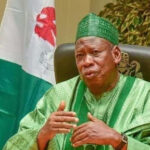Isa Gusau is Special Adviser on Communications and Strategy to Borno Governor Kashim Shettima. In this interview, Gusau captures Shettima’s campaign for the election of Prof Babagana Umara Zulum, governorship candidate of the All Progressives Congress (APC). Excerpt:
PDP’s presidential candidate Atiku Abubakar who scored 65,000 votes in Borno State has dismissed Buhari’s 841,000 votes in the state. The former VP considers it an irony that voters increased despite insecurity. What is your take?
Let’s first recall that after his presidential campaign in Maiduguri, Alhaji Atiku Abubakar sent out a tweet with pictures at 10:26am, on February 6, 2019. You all can see that message from his verified handle. He wrote that despite the security challenges, the people Borno came out in very high number to support PDP. From that tweet, the same Atiku Abubakar admitted that security challenges have not quite dampened the participation of Borno people in the electoral process. By the way, the results were consistent with previous voting patterns in Borno.
How do you mean?
If you look at the 2007 election results in which Buhari was candidate of the ANPP and Atiku was candidate of the Action Congress, the gap between Buhari and Atiku is consistent with the outcome of the 2019 election. This is despite Atiku’s advantage of having been vice president. I listened to some PDP supporters wondering why Buhari got 841, 000 in 2019 whereas in 2015, the same Buhari got 473,000 votes in Borno.
What the PDP ignores is that back in 2015, 20 local government areas in Borno held their elections in Maiduguri IDP camps. For instance, all the 10 local government areas in northern Borno held elections in different Maiduguri IDP camps. 10 others like Gwoza, Bama, Askira Uba, Ngala, Dikwa, Kala-Balge etcetera from Borno south and central, all held elections in Maiduguri IDP camps. That accounted for the 473,000 votes Buhari got.
Thousands of eligible voters who support Buhari had fled to different states while others took refuge in Cameroon, Niger and Chad. Now, compared to 2019, the situation was different. For instance, only Abadam and Kukawa local government areas held elections within IDP camps in Maiduguri and the votes were as low as those of 2015. For instance, if you take Abadam which has about 40,000 registered voters or so, Buhari scored only 5,907 votes despite being popular in that local government. The result was similar from Kukawa IDPs.
Significantly, also, majority of Borno’s 27 local government areas held the 2019 elections in their respective headquarters and major towns. This resulted in Buhari’s 841,000 votes. Importantly also are Buhari had Governor Kashim Shettima’s aggressive campaigns, strategic planning, coordination and mobilization of APC stakeholders.
Do you expect similar results in favour of APC for the governorship election?
The governor aims for more. If you listened to his post-election message last week, he reminded APC stakeholders of a bigger task in a few days. He clearly referred to the governorship. He mentioned that even though the APC has in Professor Babagana Umara Zulum, a candidate with incredible popularity, the party must confront the governorship and state assembly elections with serious commitment.
A PDP factional chairman had identified Governor Shettima as responsible for what he called Atiku’s embarrassing scores in Borno. Don’t you think Atiku may want to deploy resources to ensure PDP’s victory at the governorship in order to unsettle Shettima?
Borno’s politics will insha’Allah be determined in Borno not from Abuja. Governor Shettima is one of the most tactical leaders I have ever come across. He makes maximum use of Professor Babagana Umara Zulum’s popularity by being the chief campaigner. In his campaigns, Governor Shettima regularly mentions 10 unique things about Professor Zulum.
What are these 10 things?
The first thing Governor Shettima reminds voters everywhere is Professor Zulum’s delivery record as the man who executed Borno’s resettlement plan by building more than 30,000 houses across communities in 18 local government areas. In addition, Zulum rebuilt hundreds of schools, dozens of hospitals, local government secretariats, palaces of traditional rulers and police stations. He restored water supply and livelihoods. With Zulum’s execution of Shettima’s goals, displaced persons were resettled in 14 local government areas.
The second thing the governor mentions is Zulum’s integrity. In the course of massive rebuilding, the governor approved billions of naira for Zulum but the professor was never associated with any act of dishonesty. The third is Zulum’s prudence. In July, 2016, the Victims Support Fund under General T.Y. Danjuma publicly acknowledged that the fund donated building materials worth N250m for the rebuilding of 24 public establishments that included a General Hospital, schools, local government secretariats, palace, police stations and others in Dikwa Local Government Area of Borno State. However, Prof. Zulum delivered the 24 projects and used the remaining materials to complete 16 additional projects in Dikwa which were not listed by the VSF.
So, 40 projects were rehabilitated due to Zulum’s prudence. The fourth is Zulum’s courage and fearlessness. Governor Shettima always cites that between 2015 and 2016, Zulum had come under Boko Haram attacks twice while he was traveling from Maiduguri to places like Bama, Gwoza, Ngala, Kukawa, Damasak and others, to coordinate assessments and rebuilding of communities. These threats did not stop the professor from achieving Shettima’s goal of rebuilding communities.
As fifth, the Governor regularly reminds voters of Zulum’s story. Zulum’s struggles resonate with poor citizens. Shettima normally cites that Zulum was a commercial driver for 16 years, he even transported firewood and operated grinding machines. The governor talks about how Zulum struggled to pay his school fees in the midst of difficulties before rising from grass to grace. Shettima believes that Zulum’s story is enough to make him work for the poor because he shared their experiences. The sixth thing Governor Shettima says is Professor Zulum’s depth of Islamic knowledge, his memorization and understanding of the holy Qur’an. To the Governor, Islamic knowledge, defines Zulum’s humility, his truthfulness and other personal principles. The eight thing Governor Shettima cites is Zulum’s ability to relate with different kinds of people.
As ninth, Governor Shettima cites Professor Zulum’s productive age. Shettima feels that being an under-50 with sound health are conditions needed by a governor to confront the next phase of rebuilding Borno. The tenth thing I captured is Governor Shettima’s description of Professor Zulum as a workhorse. Zulum is extremely hard working. As we know, there are people who may be honest and knowledgeable but they are very lazy. There are some who may be intelligent and hardworking but are either dishonest or arrogant. Shettima reminds everyone that Zulum combines the rare qualities of being a workaholic, rugged, honest, humble, vast in knowledge, courageous and is passionate about the prosperity of Borno.

 Join Daily Trust WhatsApp Community For Quick Access To News and Happenings Around You.
Join Daily Trust WhatsApp Community For Quick Access To News and Happenings Around You.


